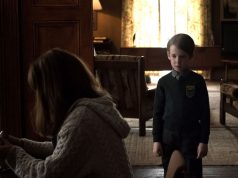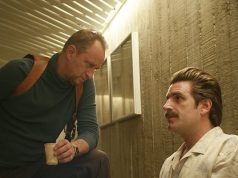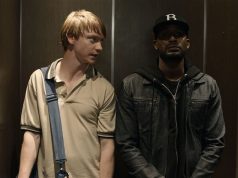Two of Bernardo Bertolucci’s great loves — sex and movies — are celebrated, analyzed, partaken of and discussed in “The Dreamers,” a film that, despite its potentially volatile subject matter, is innocuous and good-natured.
It’s a bit of a history lesson for folks younger than, say, 40. I wrote just a week ago that the Vietnam documentary “The Fog of War” cannot possibly mean as much to a Gen-Xer (or -Yer, or anyone younger) as it would to a Baby Boomer, and the same holds true of “The Dreamers.”
It is set in Paris in 1968, when the French New Wave filmmakers like Godard and Truffaut were changing the art of moviemaking, and when a Parisian student riot was about to erupt because, of all things, the director of the Cinematheque Francais had been fired. In the midst of all this is naive American student Matthew (Michael Pitt), a 20-year-old film buff who spends every waking hour at the cinema, along with his unwashed, unkempt film-buff brethren and sisters. He meets his kindred spirits, twins named Theo (Louis Garrel) and Isabelle (Eva Green), who invite him to stay at their family’s apartment.
Here they engage in all manner of mind games, movie-trivia games and sex games, a strange triangle of youthful insouciance and blithe know-it-allness. The three are partly lovers, and partly just lovers of film. Outside, though, events are conspiring that will foment revolution.
The characters speak, think and act in the language of film; for them, movies are everything. Cinema informs everything they do. It is the same way for Bertolucci, and it’s energizing to see a movie so devoted to conveying that obsession. Snippets of old movies are spliced in as they are referenced, a dozen or so in total, plus many more that are mentioned but not shown.
When Matthew and Theo argue over whether Chaplin or Keaton was better, Theo makes his case by describing the final moments of Chaplin’s “City Lights.” By coincidence, I had seen this movie for the first time about two weeks before seeing “The Dreamers,” so it was fresh in my mind — but what Theo says about it is something I hadn’t considered, and it made me want to go watch it again. Bertolucci has succeeded in making a movie that makes me want to go watch OTHER movies.
Other movies are, to be sure, more emotionally engaging than this one, whose characters are aloof and inscrutable. Few movies, though, are more beautifully composed: Bertolucci and cinematographer Fabio Cianchetti construct every shot carefully, often building shapes out of the characters’ positions or referencing shots from other films. Even if you don’t pay attention to such things, you will subconsciously realize you’re watching something that has been assembled with precision and expertise.
I don’t know how much a casual filmgoer will like the movie. It seems designed only for hardcore movie buffs — and I mean movie buffs who are hardcore about it, not buffs of hardcore movies (though I suppose that applies to certain elements of it, too). It speaks with enthusiasm about its subject matter; the question is whether it’s preaching to the choir, or to the uninterested.
Note: Much has been made of the film’s NC-17 rating for “explicit sexual content.” In truth, the sexual content is no more explicit than many R-rated films; it is, rather, the nudity (and the frequency of it) that is more explicit than usual. The film is set in the height of the sexual revolution, which coincided with (and is interconnected with) the French New Wave and the Parisian student riots, and thus a high degree of sexuality and nudity fit the story. I’m not sure it’s all completely “justified,” but since when are filmmakers required to “justify” themselves to anyone?
B (1 hr., 55 min.; )





